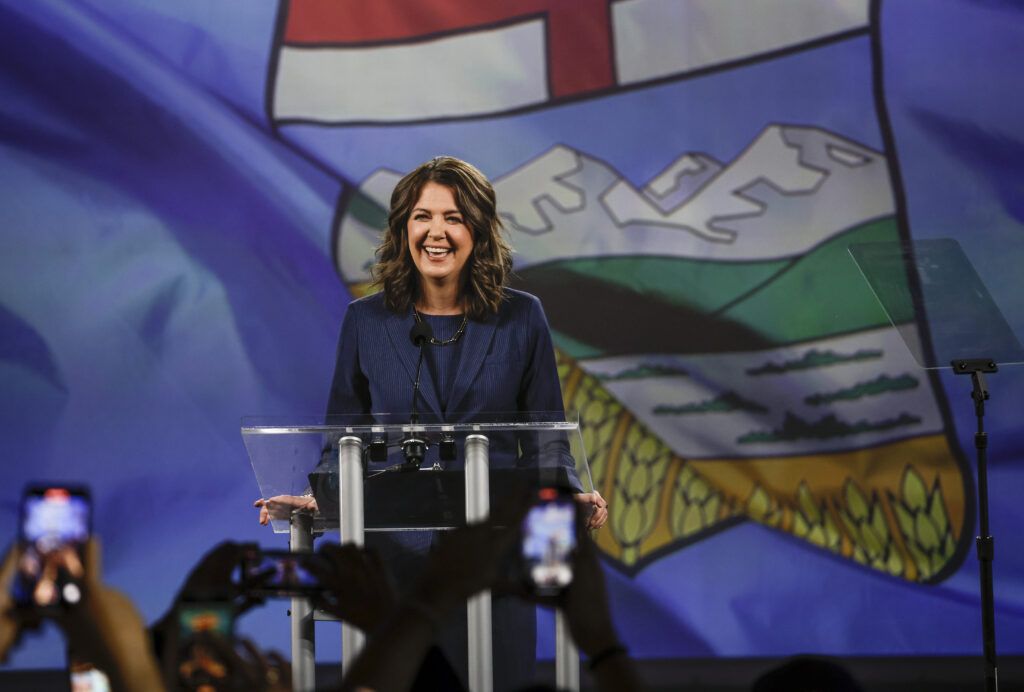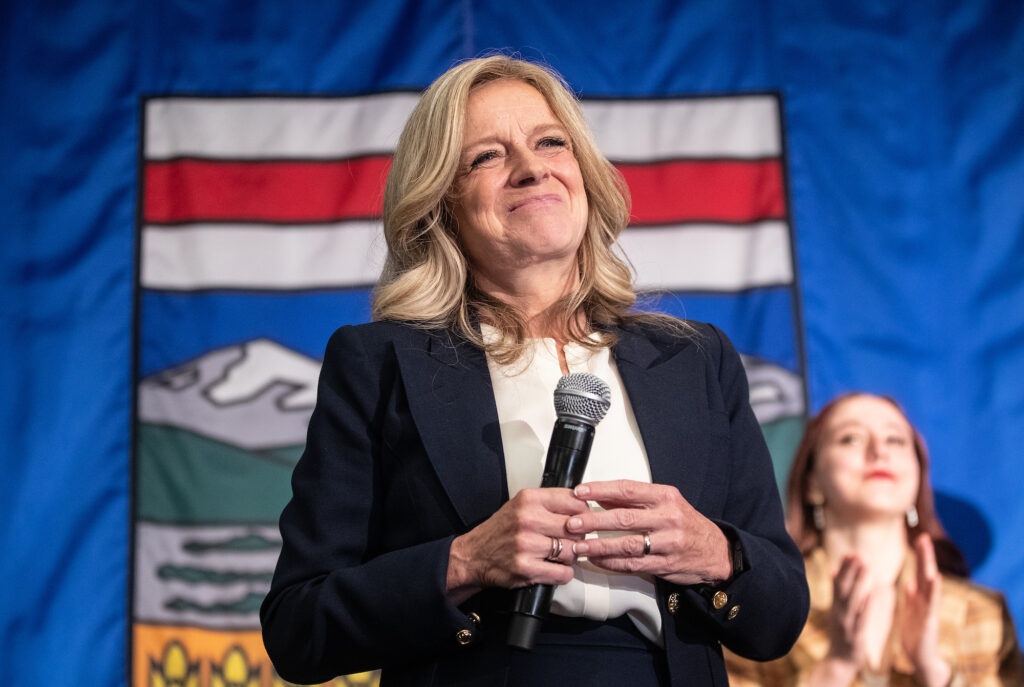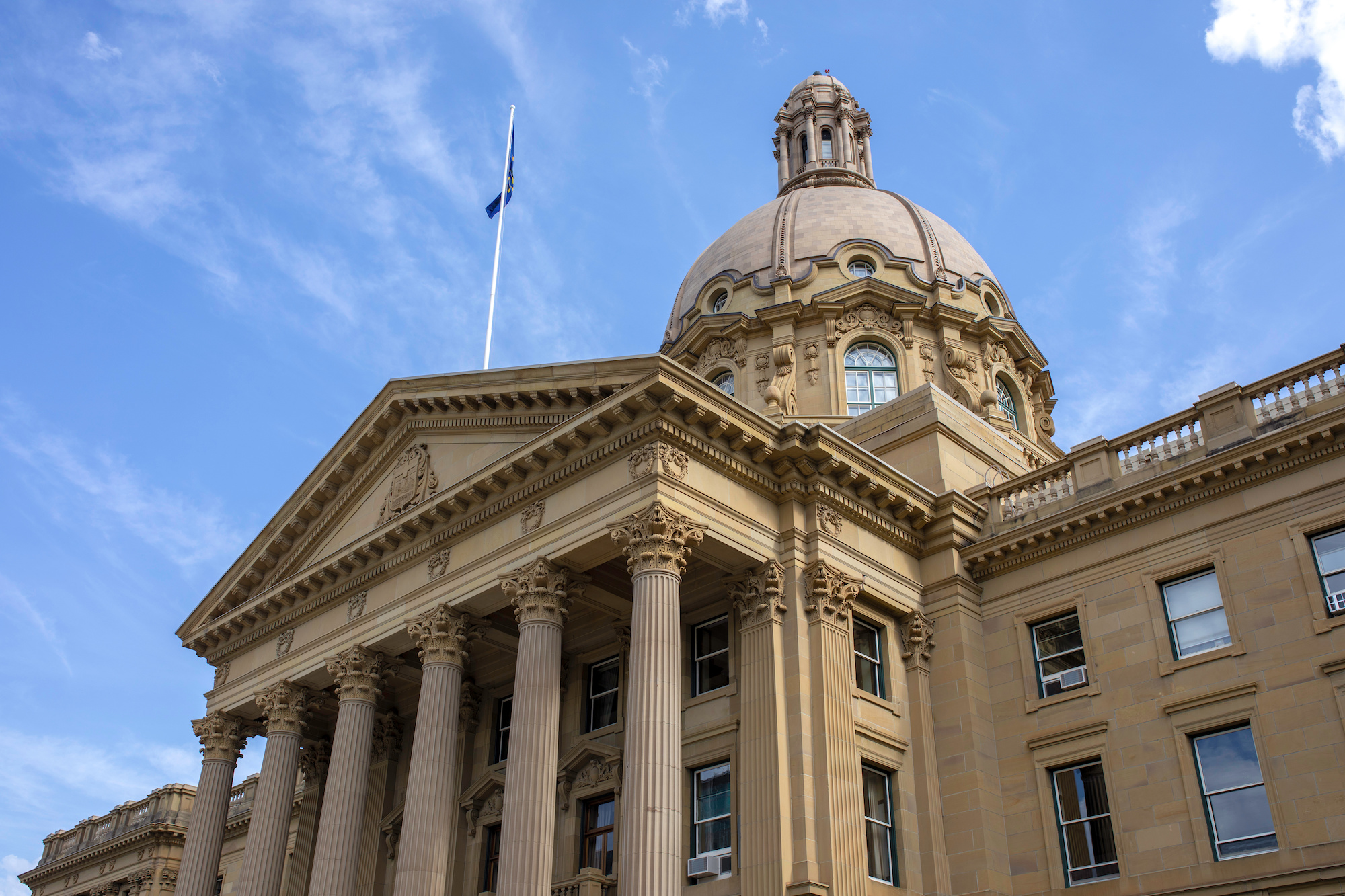The United Conservative Party (UCP) and its leader, Premier Danielle Smith, won a reduced majority government in the May 29th Alberta election. With 87 seats up for grabs, the UCP won or is leading in 49 ridings with Rachel Notley’s NDP victorious or leading in 38 ridings.
Going into the election with 60 seats, the UCP lost 11 seats and Premier Smith will lead the thinnest majority in Alberta’s history. The NDP increased its seat count from 23 to 38, meaning that Notley will lead the largest opposition contingent ever in the legislature.
With just under 2,285,000 eligible voters, roughly 1.7 million people cast ballots in the election, according to Elections Alberta’s preliminary results, with voter turnout dropping marginally to 62 per cent compared with 67.5 per cent in 2019, which is still higher than the national average turnout.

Several UCP ministers defeated
While the UCP scored a solid victory, at least five key ministers in the UCP government went down to defeat, while more are trailing in constituencies that are still too close to call:
- In Calgary, current Health Minister Jason Copping was defeated, and Tyler Shandro, the minister of justice and attorney general, also lost his seat. The result for Shandro is pending a recount in the riding of Calgary-Acadia. Shandro was behind by seven votes as of Tuesday, May 30th.
- Nicholas Milliken, formerly minister of mental health and addictions, was also defeated in Calgary.
- Deputy Premier Kaycee Madu, Smith’s only Edmonton cabinet minister, who was the first Black person in Alberta history to be named justice minister and attorney general, was defeated in Edmonton, completing a clean sweep of all 20 Edmonton seats for the NDP.
- Jeremy Nixon, minister of seniors, community and social services lost in Calgary-Klein, Jason Luan, minister of culture, lost in Calgary-Foothills and Minister of Infrastructure Prasad Panda lost in Calgary-Edgemont.
Retaining their seats are the Minister of Transportation Rajan Sawney in Calgary North West, Minister of Public Safety and Emergency Services Mike Ellis in Calgary-West, Minister of Advanced Education Demetrios Nicolaides, and Minister of Education Adriana LaGrange in Red Deer-North.
Battleground Calgary
Calgary lived up to its pre-election billing as a major battleground for the two parties. The NDP not only retained its three sitting members but is also projected to add 11 new seats out of the city’s 26 ridings. As of Tuesday morning, CBC is reporting that the NDP had earned the most votes across all Calgary ridings, with 49.3 per cent of the total ballots cast in the city, compared to 48.2 per cent for the UCP. With such close results, it’s not surprising that some margins of victory in Calgary are as thin as seven votes.
Rural and small-town Alberta
In the 41 seats outside of Edmonton and Calgary, the results came in as expected in advance of the election. The UCP swept the rural areas and small towns and cities with two exceptions. In Lethbridge, former NDP cabinet minister Shannon Phillips retained her seat, and in Banff-Kananaskis, where residents were still upset over the Jason Kenney government’s attempt to open the eastern slopes of the Rockies to coal mining, the NDP took the seat from the UCP.
Campaign dynamics
The UCP was fighting for re-election after a tough four years in office, marked by a sharp plunge and then a recovery in energy prices, the COVID-19 pandemic and internal strife that led to the resignation of former leader Jason Kenney. The party under Danielle Smith pitched itself as the fiscally-responsible choice compared with the NDP – one that would drive economic growth and make life more affordable.
Rachel Notley and the NDP focused on swaying doubtful conservative and undecided voters to their side by positioning Notley as a stable and capable leader. The party repeatedly pointed to Premier Smith’s shifting statements on issues such as health care and the breaking of ethics rules, while underlining the NDP’s plans to improve health-care delivery and create jobs.
While the gain in seats for the NDP suggests that Notley was successful in shaking the faith of many Albertans in Smith’s ability to govern competently, these fears were not enough to overcome the strength of the UCP in rural and small-town Alberta.
UCP policy
The UCP’s published election policy platform was moderate and centrist. No mention was made on the Sovereignty Act, which would enable the province to direct its agencies and municipalities to ignore federal policies and programs deemed by the legislature not to be in Alberta’s interests. Similarly, the platform did not include long-standing UCP proposals to replace the RCMP with a provincial police force or to replace the Canada Pension Plan with a retirement income plan that is administered by the province.
Given the strong support the party gained yesterday from populist voters in the rural areas of the province, we should expect Smith to come under pressure to resurrect these policy proposals.
Future of the NDP
While it may not be up to Rachel Notley, but to Alberta NDP members at the next convention, Notley made it clear that, “now is the time for us to do the work that has been asked of us. It is my honour to serve as your leader and it is my privilege to continue to serve as leader of the official opposition.”
For now, any Alberta New Democrat with leadership ambitions has given Notley the space to remain as leader undisturbed.

Implications for federal-provincial relations
Premier Smith has already signalled her opposition to the federal “just transition” program to shift energy jobs from unsustainable sources to more eco-friendly ones, calling the program an “unconstitutional and existential threat” to the provincial economy.
In her victory speech last night, Premier Smith called out the federal government on its “anti-energy policies,” reinforcing the approach that helped get her elected as UCP leader and premier, and the themes she pushed in the campaign on who was the better leader and party to protect Alberta’s interests against Ottawa:
My fellow Albertans, we need to come together no matter how we have voted to stand shoulder-to-shoulder against soon-to-be-announced Ottawa policies that would significantly harm our provincial economy.
Now, we’ve been made aware that in the coming weeks, Justin Trudeau was planning on bringing forward new restrictions on electricity generation from natural gas that will not only massively increase your power bills but will also endanger the integrity and reliability of our entire power grid which we rely on during our cold and dark Alberta winters.
In addition, the prime minister is already ready to introduce a de facto production cap on our oil and gas sector that, if implemented will result in tens of thousands of jobs lost, tens of billions in lost investment, damage our province’s fiscal position and bring economic hardship to Albertans.
And if he persists, he will be hurting Canadians from coast to coast and he will strain the patience and goodwill of Albertans in an unprecedented fashion. And as premier, I cannot under any circumstances allow these contemplated federal policies to be inflicted upon Albertans. I simply can’t and I won’t.”
Smith closed her speech with an appeal to the prime minister to work collaboratively with the province on energy and emissions strategies:
And so I invite the prime minister to halt the introduction of these harmful policies and come to the table in good faith to work collaboratively with Alberta on an energy and emissions strategy that will both grow the Alberta and Canadian economies while using the export of Alberta LNG and emerging technologies to achieve meaningful reductions in emissions because when Canadians work together, there’s no challenge that we can’t overcome.”
